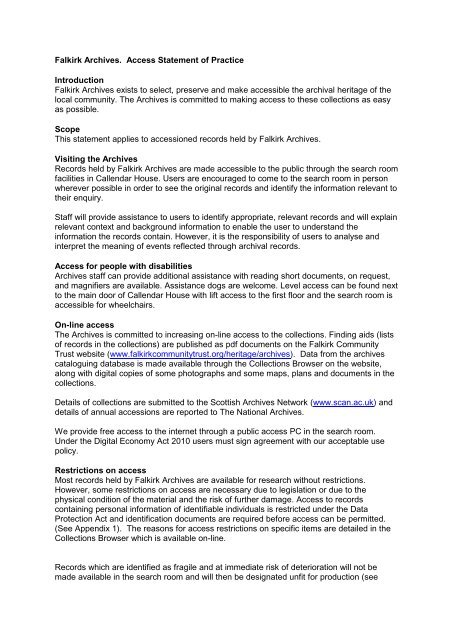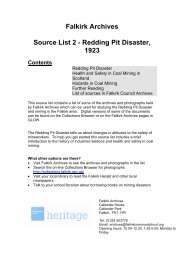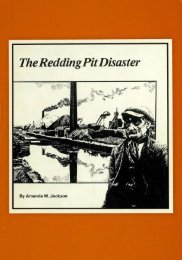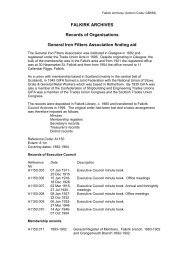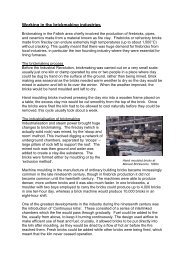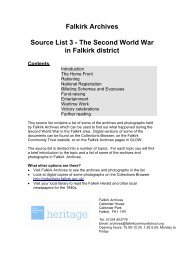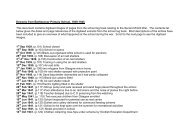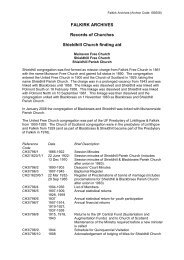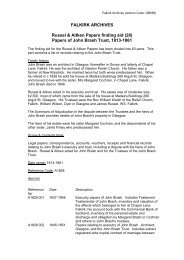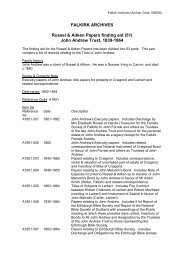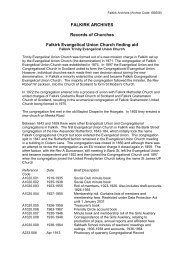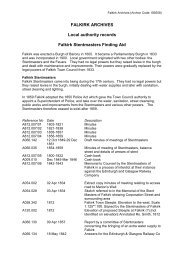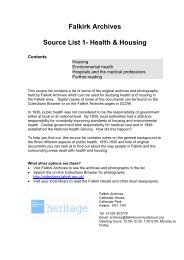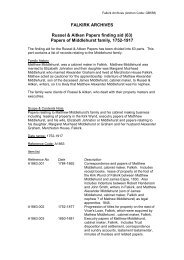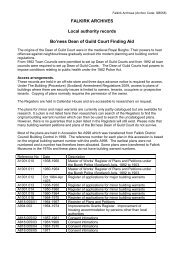Archives Access Statement - Falkirk Community Trust
Archives Access Statement - Falkirk Community Trust
Archives Access Statement - Falkirk Community Trust
Create successful ePaper yourself
Turn your PDF publications into a flip-book with our unique Google optimized e-Paper software.
<strong>Falkirk</strong> <strong>Archives</strong>. <strong>Access</strong> <strong>Statement</strong> of Practice<br />
Introduction<br />
<strong>Falkirk</strong> <strong>Archives</strong> exists to select, preserve and make accessible the archival heritage of the<br />
local community. The <strong>Archives</strong> is committed to making access to these collections as easy<br />
as possible.<br />
Scope<br />
This statement applies to accessioned records held by <strong>Falkirk</strong> <strong>Archives</strong>.<br />
Visiting the <strong>Archives</strong><br />
Records held by <strong>Falkirk</strong> <strong>Archives</strong> are made accessible to the public through the search room<br />
facilities in Callendar House. Users are encouraged to come to the search room in person<br />
wherever possible in order to see the original records and identify the information relevant to<br />
their enquiry.<br />
Staff will provide assistance to users to identify appropriate, relevant records and will explain<br />
relevant context and background information to enable the user to understand the<br />
information the records contain. However, it is the responsibility of users to analyse and<br />
interpret the meaning of events reflected through archival records.<br />
<strong>Access</strong> for people with disabilities<br />
<strong>Archives</strong> staff can provide additional assistance with reading short documents, on request,<br />
and magnifiers are available. Assistance dogs are welcome. Level access can be found next<br />
to the main door of Callendar House with lift access to the first floor and the search room is<br />
accessible for wheelchairs.<br />
On-line access<br />
The <strong>Archives</strong> is committed to increasing on-line access to the collections. Finding aids (lists<br />
of records in the collections) are published as pdf documents on the <strong>Falkirk</strong> <strong>Community</strong><br />
<strong>Trust</strong> website (www.falkirkcommunitytrust.org/heritage/archives). Data from the archives<br />
cataloguing database is made available through the Collections Browser on the website,<br />
along with digital copies of some photographs and some maps, plans and documents in the<br />
collections.<br />
Details of collections are submitted to the Scottish <strong>Archives</strong> Network (www.scan.ac.uk) and<br />
details of annual accessions are reported to The National <strong>Archives</strong>.<br />
We provide free access to the internet through a public access PC in the search room.<br />
Under the Digital Economy Act 2010 users must sign agreement with our acceptable use<br />
policy.<br />
Restrictions on access<br />
Most records held by <strong>Falkirk</strong> <strong>Archives</strong> are available for research without restrictions.<br />
However, some restrictions on access are necessary due to legislation or due to the<br />
physical condition of the material and the risk of further damage. <strong>Access</strong> to records<br />
containing personal information of identifiable individuals is restricted under the Data<br />
Protection Act and identification documents are required before access can be permitted.<br />
(See Appendix 1). The reasons for access restrictions on specific items are detailed in the<br />
Collections Browser which is available on-line.<br />
Records which are identified as fragile and at immediate risk of deterioration will not be<br />
made available in the search room and will then be designated unfit for production (see
<strong>Archives</strong> Preservation <strong>Statement</strong> of Practice). We make this information available on the<br />
Collections Browser as quickly as possible after we have identified the risk to the records.<br />
Restrictions on copying<br />
Copies of records will be provided on request wherever possible. The cost is specified on<br />
the current list of fees and charges. Photocopying is undertaken by <strong>Archives</strong> staff, who have<br />
discretion to postpone the copying process in order to meet operational priorities in the<br />
search room.<br />
Copyright legislation and other legislation may prevent copying of records and this will be<br />
explained by <strong>Archives</strong> staff when copies are requested. Information about arrangements for<br />
licensing of images or reproductions for public use are available on request and standard<br />
conditions are stated on our photograph order form. The cost is specified on the current list<br />
of fees and charges.<br />
Where there is a risk of damage to the original record by the process of copying, copying<br />
will not be permitted. The use of digital cameras without flash is permitted in the search<br />
room provided that copyright requirements and preservation requirements are identified and<br />
resolved in advance of copying.<br />
Enquiries service<br />
<strong>Archives</strong> staff will attempt to provide information in response to enquiries by letter, fax, email<br />
or telephone. Specific questions which can be answered with limited research by staff will be<br />
undertaken free of charge and will normally be answered within five days of receipt of the<br />
enquiry.<br />
We will not normally carry out detailed research on behalf of individuals. Where detailed<br />
research is required, <strong>Falkirk</strong> <strong>Archives</strong> will<br />
provide advice to research users about relevant archives and the likelihood of their<br />
containing the information sought;<br />
discuss the research user’s aims in order to narrow down their request to a specific<br />
question which the archive service can readily answer;<br />
advise on how to research the archives using finding aids and public search/reading<br />
room facilities;<br />
provide photocopies or other images of specific documents from the archives to<br />
allow people to carry out their own research away from the archives, subject to<br />
copyright legislation and the current list of fees and charges<br />
where appropriate, suggest that the enquirer or someone acting for them visits the<br />
archive service to carry out the necessary research and where an enquirer is unable<br />
or unwilling to visit or send a representative to the archives, the archivist may<br />
suggest that they employ an independent researcher to carry out the research on<br />
their behalf<br />
where appropriate, refer the researcher to other public authorities which also hold<br />
the same information (See Appendix 2)<br />
<strong>Falkirk</strong> <strong>Archives</strong> reserves the right to charge individuals and/or organisations for the<br />
provision of detailed research or for research on sources which are widely available and not<br />
exclusive to <strong>Falkirk</strong> <strong>Archives</strong>. The availability of this service is limited by staffing and<br />
resources, and each request for the chargeable service therefore must be dealt with on a<br />
case by case basis. The service is charged at the hourly rate specified on the current list of<br />
fees and charges.
User information<br />
We ask users to provide their name and contact details when they access the archives.<br />
This is for security and statistical purposes. The information is retained for 3 years and is<br />
not passed to any third party except where required by law. Under the Digital Economy Act<br />
we require the name and contact details of all users of the internet facilities provided in the<br />
search room.<br />
Performance Measurement<br />
Statistics are collected on enquiries, outreach and productions and are reviewed on a<br />
regular basis.<br />
Review<br />
The <strong>Access</strong> <strong>Statement</strong> of Practice will be reviewed annually.<br />
Nov 2012
Appendix 1: Procedures for access to records restricted under the Data<br />
Protection Act<br />
The Data Protection Act restricts access to records containing personal information of living<br />
identifiable individuals. As it is not always possible to verify if an individual is deceased,<br />
records of this type are normally closed for 75 years if the data refers to adults, or 100 years<br />
if the data refers to children.<br />
Individuals who need evidence that their name appears in a restricted archive are<br />
entitled to have an extract confirming that. They may see the relevant page or obtain<br />
a photocopy of it provided that the names and personal details of all other individuals<br />
on the page are covered up and the archives staff supervise the researcher closely<br />
while looking at the document. The individuals must provide evidence of their identity<br />
(preferably a photo-id such as a photo driving licence or a passport) and must sign<br />
the Data Protection access request form Section A.<br />
Individuals who want to study documents for historical or statistical purposes can see<br />
Data Protected documents provided they are able to sign Section B of the Data<br />
Protection access request form. Research for historical purposes means research<br />
where the names and identities of the individuals are irrelevant and where the<br />
researcher agrees not to reveal these names or other identifying information.<br />
Evidence of research purposes is required before access can be permitted (such as<br />
a letter from the research funding authority) along with evidence of the identity of the<br />
researcher.<br />
Police Officers or representatives of the Procurator Fiscal are entitled to see<br />
restricted archives provided they come in person to the <strong>Archives</strong> to see the<br />
document(s) and produce a Data Protection Exemption Form which is issued by<br />
the relevant police force.
Appendix 2: Restrictions on enquiries service<br />
The Old Parish Records (OPRs) and Census returns relating to the <strong>Falkirk</strong> area are widely<br />
available sources, which are not exclusive to <strong>Falkirk</strong> <strong>Archives</strong>. The <strong>Archives</strong> holds microfilm<br />
copies, which are made available to the public visiting the archive service.<br />
Researchers who, for various reasons, are unable to visit the <strong>Archives</strong> to consult them<br />
should be advised on the alternatives:-<br />
GROS offers access to the OPRs via the Internet<br />
(www.scotlandspeople.gov.uk) which is very useful to remote/overseas users. There<br />
are fees for extracts and information.<br />
Researchers can visit GROS to see the OPRs. There is a fee for access.<br />
Researchers can visit local registrars across Scotland. There is a fee set locally for<br />
access.<br />
Researchers can visit <strong>Falkirk</strong> Library or Grangemouth Library to see them free of<br />
charge (they have longer opening hours than the <strong>Archives</strong>)<br />
If researchers request research involving the Old Parish Records and/or the Census returns,<br />
<strong>Falkirk</strong> <strong>Archives</strong> will reserve the right to charge individuals and/or organisations for such<br />
service. Each case will be assessed individually taking into account<br />
Amount of information required<br />
Resources available (members of staff) and estimated time to do the research.<br />
Nature of information required<br />
The current fee is charged per hour.
Appendix 3: <strong>Falkirk</strong> <strong>Archives</strong> Search Room Guidelines<br />
The documents, books, maps, photographs and other items held by <strong>Falkirk</strong> <strong>Archives</strong> are<br />
often very rare or unique. Please help us to look after these.<br />
Please use a pencil for taking notes<br />
Do not eat, drink or smoke (including sweets and chewing gum)<br />
Make sure your hands are clean<br />
Avoid touching inks or pigments on the documents<br />
Handle photographs by the edge only<br />
Do not touch the surface of transparencies<br />
Do not write on or mark the items in any way<br />
Use the weights provided to hold rolled documents in place<br />
Use the book bag provided to support the bindings of large bound volumes<br />
Ask for polyester film if you want to trace maps<br />
Normally only three items may be consulted at one time.<br />
We will photocopy items for you. If the item might be damaged by photocopying then<br />
we will not allow it to be photocopied.
Appendix 4: Acceptable Use of Our System<br />
On first accessing the Internet on a <strong>Falkirk</strong> <strong>Community</strong> <strong>Trust</strong> PC, you will be asked to confirm that you<br />
have read this guide and that you agree to abide by it. In doing so, you agree that you will not<br />
intentionally access any material which:<br />
is obscene, sexually explicit, racist, defamatory or illegal<br />
causes harassment or gross offence to others<br />
would be a breach of copyright.<br />
In addition, you are agreeing that you will not interfere in any way with the hardware, software or<br />
general operation of the PC. Any user must stop any activity if requested to do so by a member of<br />
staff. Any breach of the Acceptable Use policy will result in your Internet access being withdrawn.<br />
Copyright:<br />
You must ensure that you do not break any laws of copyright.<br />
If any site gives you specific permission to copy information, you may make as many copies or prints<br />
as you wish.<br />
If any site specifically forbids copies of the information being made, you must respect this, and under<br />
no circumstances should you make any copies or prints.<br />
If no mention is made of copyright issues on the site, you may make one printed copy for your own<br />
use, but no other copies may be made.<br />
The following are not permitted :<br />
Sending or displaying offensive messages or pictures<br />
Using or displaying inappropriate and/or obscene language<br />
Attempting to access sites and material you know to be offensive<br />
Downloading software<br />
Using the <strong>Community</strong> <strong>Trust</strong>’s Internet facility for the purpose of gambling where the reputation of<br />
the <strong>Trust</strong> may be at risk<br />
Breaking or attempting to break any system security controls placed on your Internet account<br />
Intentionally accessing or transmitting computer viruses or software programs used to trigger<br />
these.<br />
Knowingly doing anything which constitutes breaking the law.<br />
I have read and agree to abide by <strong>Falkirk</strong> <strong>Community</strong> <strong>Trust</strong>’s acceptable use policy<br />
Name:<br />
Address:<br />
ALL ACCESS TO THE INTERNET IS MONITORED AND RECORDED BY THE COUNCIL


